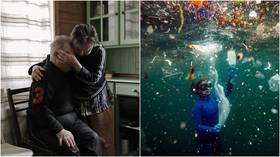Plastic pollution could kill our oceans in 30 years, and the global trade titans simply don’t care

There’s a simple solution to the threat our oceans face: use less plastic. History shows there are alternative products. But because of the dominance of worldwide consumer monopolies, profit is being prioritized before protection.
The prediction might be more accurately stated as: there will be only plastic remaining in the ocean by 2050. Perhaps also a few jellyfish. It is also likely that only 10% of coral reef will be left alive.
So that is to say, in only 30 years from now, it is quite possible that the oceans will be effectively dead.
While there is much talk of carbon agreements and the effect of ocean acidification due to climate change, the issue of plastic pollution seems to have largely fallen off the activist radar. Meanwhile, the use of plastics has actually increased dramatically in the last 50 years and is expected to double again in the next 20. It does seem to strike anyone who has followed the ocean pollution crisis for any length of time that those in true positions of power in the world economy, financially, have not the faintest interest in actually addressing this problem.
Also on rt.com The fashion industry is a perfect reflection of our vapid, valueless and globalised society that treats everything as disposablePoliticians may occasionally speak of it, but then only with fey schemes which make it sound like sweeping change can occur without the faintest alteration in voter lifestyles.
But those who really manage the mechanics of consumer capital, and the network of global consumption, show no sign of caring to alter the patently insane and wasteful system of single-use plastics. Plastic packaging is generally only used once, with a value in the range of $120 billion lost each year, while being perhaps the most inherently non-disposable item on the planet.
While seemingly the fossil fuel industry is the source for both climate change and plastic waste (plastic is an oil by-product), the responsibility for plastic overuse must lie with the manufacturers of consumer products and arguably with the consumers themselves, as single-use plastic is used to seal and retain, or at least give the impression of, product ‘newness’.
But pinpointing the individuals with responsibility and power to change this dangerous habit is difficult, as it is diffused across a vast interlocking network.
The culprit is, in a sense, the very distribution system of worldwide transit itself, which is largely the result of a ‘free trade’ monopoly which the massive consumer goods manufacturers enjoy.
The entire system is essentially the profiteering from third-world labour – and seasonal differences – by the distributor, who shortcuts past local artisanry, local employment, healthy natural materials, and natural in-season foods to exploit cheap shipping. Food and other ‘products’ are sent around the globe to be created and sold. Any of those items which aren’t wrapped in plastic during this manufacturing journey are already made of plastic.
Renewable energy is a worthy cause, but it is worth constantly reminding ourselves that truly ‘renewable systems’ are something we had and lived with for all of history before the 19th century. Things may have been ‘slower’ before the industrial revolution, but there were vast and well-fed empires, and complex human systems, which functioned and thrived without removing humans from the natural cycle. There was no threat back then to life on Earth itself simply from the structure and spoil of our work.
So, we know from the record of history it is possible. But I would argue it is not precisely the technological achievement of the industrial revolution that has proven so dangerous to ecological balance, so much as its application strictly to mercantile matters of commerce and mass production for profit. We can likely alter our values more easily than reverse technology. There was a time, right up to the late 1980s, when almost all human domestic waste consisted of paper, tin, glass, and wood. There were no plastic water bottles to dump in the oceans, and people drank water from the tap.
It was not long after the various wonders of industrial technology were exploited for the corporate assembly line that these formerly hand-made mass products began to more and more resemble just junk, and did not last through repeated use.
Objects formerly made of wood, resin, stone, or cloth are now almost universally made of cheap and toxic plastic – evolutionary downgrades along a timeline of values that place quantity over quality. This is purely for reasons of profit. Soon after, we developed the insane concept of ‘planned obsolescence’, which in itself proves we are slaves to this ‘market’ beyond sense or survival.
Many rely upon the mythical promises of nuclear fusion in their desperate panic to avoid scenes of happy but hard-labouring farm workers or stone masons from ancestral photos. But it seems there is no realistic attempt from the system itself – if anyone can be said to truly ‘control it’ – to alter in any way the habits or progress of its ‘market demand’ matrix, of which it is its own greatest influencer (media ads from manufacturers now tell a suggestible public what they want).
None of the ‘elite’s’ complicated solutions to the outrageously apocalyptic problem of ‘the death of the ocean’ sound particularly practical. Next-generation batteries, electrified ports, oil spill and shipping noise reduction, along with carbon taxes and increased recycling, all seem like temporary, evasive posturing, when in fact the problem actually has a solution, one which merely requires a sacrifice of our routine.
The solution is, amazingly: stop wrapping everything in plastic.
But the plastic issue falls by the wayside when a technocrat begins promising technological solutions to technological problems. True change and lifestyle sacrifices are required. It is doubly sad as this practical sacrifice may not even affect the public particularly – and may even improve our lives – but would instead have an impact on the globalist monopolies. It is they who risk seeing a fraction of financial loss at the value change – at the creation of more localised product-flows and a renewed reliance on parochial business, of local (not global) food and daily use consumption items.
Desperate to avoid this, the monopolies play both sides, making their ad slogans and political posturings sympathetic to the trendy causes espoused by Greta Thunberg, with no intent to make any fundamental change to ‘business as usual’. Most neo-liberal ‘environmentalist activism’ is their creation, a distraction.
Meanwhile, human industry in the ocean continues to grow at exponential rates. Naval ropes used to work perfectly well when they were made of hemp and flax, before they were all made of the non-degradable blue plastic we see choking sea life and beaches. If tarps, nets, and food wrappings (all now made of plastic) went back to being made of natural materials, then it would not matter how much of them ‘fell overboard’. If clogged rivers of rubbish in Asia were full of mostly food waste, paper and wood, it wouldn’t even particularly matter, at all. It may even be healthy for the ocean.
Because of the utter and total dominance of global consumer monopolies in our lives, solutions to issues like single-use plastics need to be ‘economically viable’. Not a percentage of profit can be put at risk, even apparently to save something like the oceans themselves. And we, who will pay the price, are trapped by our cowed dependence on the values of modern consumerism, and the loss of the spirit of the ‘local’ to the values of the ‘global’. We will lose everything, not even for a possible reality, but in pursuit of a childish utopian fiction we were sold by advertisements.
Also on rt.com The big eco dilemma: How rare earth metals have become a thorn in the side of the green agendaNo sane solution is ever offered by the likes of the World Economic Forum because it is not allowed to fundamentally question these globalist free-trade values. It makes business-speak suggestions about ‘circular economy principles’ and ‘effective after-use pathways’, but never can it suggest a lessening of the power of the corporations by putting forward incentives for people to buy and eat local, and in season. While that would encourage culture, creativity, and possibly save the environment, it would hurt profits.
These are our American-empire values – the unseen, unaccountable power of mercantile oligarchs who now sit at the pinnacle of the power pyramid. We cannot repeal the industrial revolution, but we should not think ourselves so much better than our ancestors, and consider as a priority remaining humbly in sync with nature.
Think your friends would be interested? Share this story!
The statements, views and opinions expressed in this column are solely those of the author and do not necessarily represent those of RT.
















